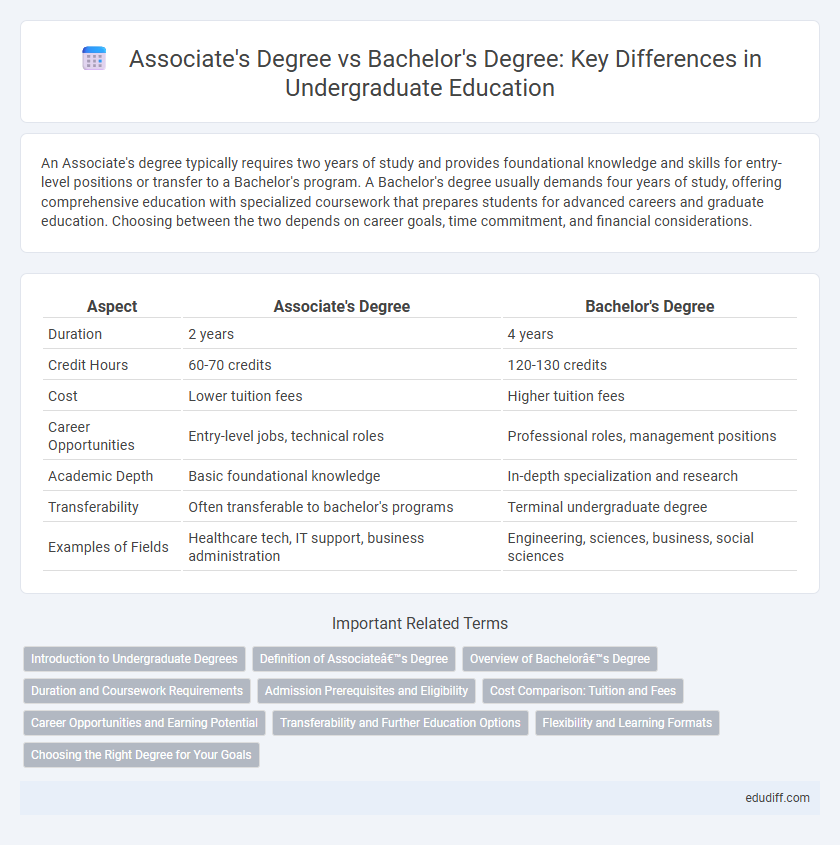An Associate's degree typically requires two years of study and provides foundational knowledge and skills for entry-level positions or transfer to a Bachelor's program. A Bachelor's degree usually demands four years of study, offering comprehensive education with specialized coursework that prepares students for advanced careers and graduate education. Choosing between the two depends on career goals, time commitment, and financial considerations.
Table of Comparison
| Aspect | Associate's Degree | Bachelor's Degree |
|---|---|---|
| Duration | 2 years | 4 years |
| Credit Hours | 60-70 credits | 120-130 credits |
| Cost | Lower tuition fees | Higher tuition fees |
| Career Opportunities | Entry-level jobs, technical roles | Professional roles, management positions |
| Academic Depth | Basic foundational knowledge | In-depth specialization and research |
| Transferability | Often transferable to bachelor's programs | Terminal undergraduate degree |
| Examples of Fields | Healthcare tech, IT support, business administration | Engineering, sciences, business, social sciences |
Introduction to Undergraduate Degrees
An Associate's degree typically requires two years of study, offering foundational knowledge and practical skills in various fields, while a Bachelor's degree usually involves four years of comprehensive education with a stronger emphasis on theoretical concepts and specialized subjects. Associate degrees often serve as a pathway to enter the workforce quickly or to transfer credits toward a Bachelor's program. Bachelor's degrees provide broader academic exposure and greater career advancement opportunities across industries such as business, engineering, and health sciences.
Definition of Associate’s Degree
An Associate's degree is an undergraduate academic credential typically earned after completing a two-year program at a community college or technical school. This degree provides foundational knowledge and practical skills in specific fields, preparing students for entry-level employment or transfer to a Bachelor's degree program. The Associate's degree serves as a cost-effective and time-efficient pathway toward higher education and career advancement.
Overview of Bachelor’s Degree
A Bachelor's degree typically requires four years of full-time study and offers a comprehensive curriculum designed to provide both broad general education and specialized knowledge in a chosen major. This degree enhances career prospects and serves as a prerequisite for advanced education such as a Master's or Doctoral degree. Bachelor's programs often include internships or research opportunities, fostering practical skills alongside theoretical learning.
Duration and Coursework Requirements
An Associate's degree typically requires about two years of full-time study and consists of around 60 credit hours, emphasizing foundational coursework and general education. A Bachelor's degree generally demands four years of study with approximately 120 credit hours, including in-depth major-specific courses and electives. The extended duration and increased credit requirements of a Bachelor's degree provide a more comprehensive academic experience compared to an Associate's degree.
Admission Prerequisites and Eligibility
Admission prerequisites for an Associate's degree typically require a high school diploma or GED, emphasizing foundational academic skills suitable for entry-level college coursework. Bachelor's degree programs demand higher eligibility standards, often including a high school diploma with a minimum GPA, standardized test scores like SAT or ACT, and sometimes prerequisite coursework in specific subjects. These eligibility criteria reflect the increased academic rigor and depth of study expected in Bachelor's degree programs compared to Associate degrees.
Cost Comparison: Tuition and Fees
An Associate's degree typically costs between $3,000 and $10,000 per year, making it a more affordable option compared to a Bachelor's degree, which ranges from $10,000 to $30,000 annually, depending on the institution. Community colleges offering Associate's degrees often have lower tuition and fees than four-year universities, reducing overall student debt. The shorter duration of Associate programs, usually two years versus four years for Bachelor's degrees, further decreases total educational expenses.
Career Opportunities and Earning Potential
An Associate's degree typically offers entry-level career opportunities in fields such as healthcare, technology, and business, with average annual earnings ranging from $40,000 to $55,000. Bachelor's degree holders access a broader range of professional roles in industries like engineering, finance, and education, often commanding salaries between $60,000 and $90,000. Employers increasingly value bachelor's degrees for advancement potential, resulting in higher lifetime earning capacity and greater career growth.
Transferability and Further Education Options
An Associate's degree offers foundational credits that can generally be transferred to bachelor's degree programs, but the number of transferable credits varies significantly between institutions. Bachelor's degrees provide a broader academic foundation and greater transfer flexibility, typically allowing students to apply more credits toward graduate studies or specialized certifications. Transfer policies depend on accreditation and articulation agreements, which directly impact further education opportunities and academic progression.
Flexibility and Learning Formats
Associate's degrees offer greater flexibility through shorter program durations and multiple part-time and online learning formats. Bachelor's degrees typically require a longer commitment but provide a wider range of specialized courses, often combining in-person, hybrid, and online options. Students seeking work-study balance or quicker entry into the workforce often prefer the adaptable structure of Associate's programs.
Choosing the Right Degree for Your Goals
Choosing the right degree between an Associate's and a Bachelor's depends heavily on your career goals, financial situation, and time commitment. An Associate's degree typically requires two years of study, offering a faster path to entry-level jobs or a foundation for transferring to a Bachelor's program. A Bachelor's degree, generally requiring four years, provides more comprehensive education and better long-term career opportunities, often leading to higher earning potential and advanced professional roles.
Associate’s degree vs Bachelor’s degree Infographic

 edudiff.com
edudiff.com